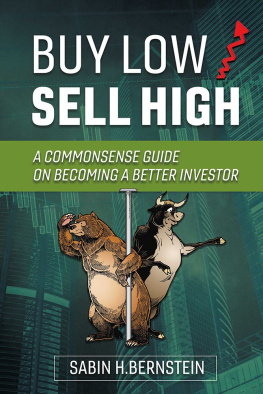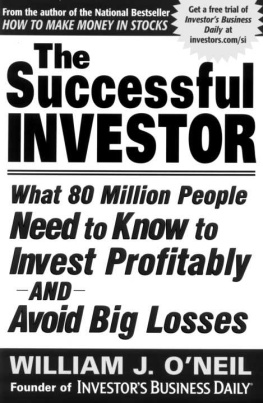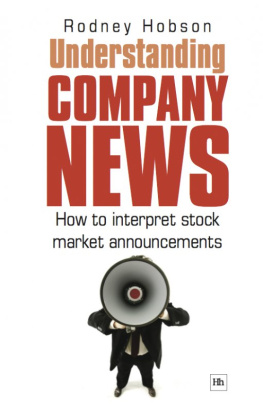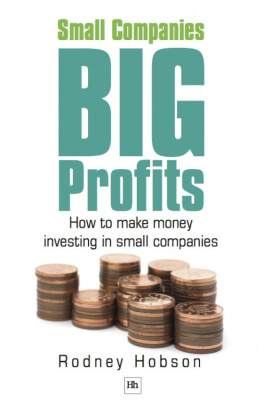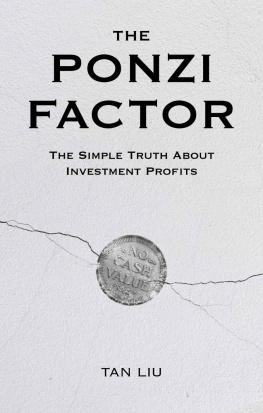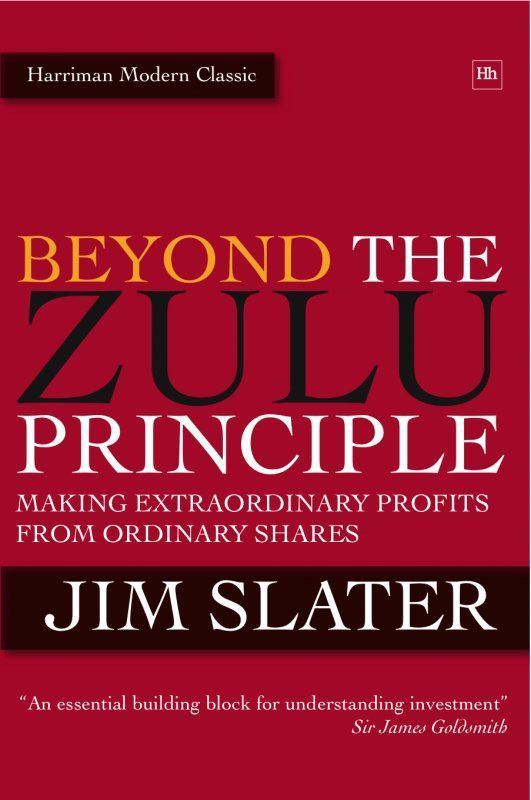Table of Contents
Publishing details
HARRIMAN HOUSE LTD
3A Penns Road
Petersfield
Hampshire
GU32 2EW
GREAT BRITAIN
Tel: +44 (0)1730 233870
Fax: +44 (0)1730 233880
Email: enquiries@harriman-house.com
Website: www.harriman-house.com
First published in 1996 by Orion Business, this edition published by Harriman House in 2011
Copyright Harriman House Ltd
Cartoons Copyright 1994,1996 McLachlan
The right of Jim Slater to be identified as the author has been asserted
in accordance with the Copyright, Design and Patents Act 1988.
ISBN: 978-0-85719-122-9
British Library Cataloguing in Publication Data
A CIP catalogue record for this book can be obtained from the British Library.
All rights reserved; no part of this publication may be reproduced, stored in a retrieval system, or transmitted in any form or by any means, electronic, mechanical, photocopying, recording, or otherwise without the prior written permission of the Publisher. This book may not be lent, resold, hired out or otherwise disposed of by way of trade in any form of binding or cover other than that in which it is published without the prior written consent of the Publisher.
No responsibility for loss occasioned to any person or corporate body acting or refraining to act as a result of reading material in this book can be accepted by the Publisher, by the Author, or by the employer of the Author.
To Helen, who has always been a long-term hold
Acknowledgements
I would like to thank Peter Scott, Graham Quick and Chris Cole of Hemmington Scott for their help in editing this book and contributing to it. Many of the lessons learned, when working together on Company REFS as a team effort are incorporated in the text. I would also like to thank my son, Mark, for editing this book and making many helpful suggestions.
Particular thanks are due to Tom Stevenson, City Editor of the Independent , for editing the final version and making many constructive suggestions for improving both the text and structure of most of the chapters.
As always, I must congratulate Edward McLachlan, who has drawn the superb cartoons. For reasons that will become apparent, my favourite is the one in chapter 19.
I would also like to thank my wife for understanding that writing takes up a lot of time that might otherwise be spent with her.
I would feel unsafe if I did not thank my secretary, Pam Hall, who is now a veteran of all of my investments books. Most of the chapters have to be typed many times before we reach a final draft. As always, Pam has been a tower of strength.
Last, but not least, thanks are due to Lesley Baxter for line-editing the final version with me. She always makes an invaluable contribution.
Preface to the 1996 Edition
Since writing the hardback version of Beyond the Zulu Principle there have been a number of important developments.
First and foremost, I am now in possession of powerful additional evidence showing the effectiveness of the investment criteria outlined in this book. The details are set out in the Appendix. I think you will find them very convincing.
Since the publication of the hardback in 1996, I have held two investment classes for beginners; one on 28 September and the other on 17 November 1997. I am unlikely to hold any more, although I will probably continue to speak at seminars like Sharelinks and those organised by the Financial Mail on Sunday .
The new electronic version of Company REFS (CD REFS) is now available on CD-ROM. This enables subscribers with a computer to obtain all the details of REFS in the Companies Volume and make their own tailor-made searches for interesting shares. Special terms are available for subscribers who want to take both the written and electronic version. For further details contact Company REFS on 020 7324 5414.
I am thinking of writing a regular monthly newsletter. If I do, it would incorporate the following features:
- Comment on the market as a whole.
- A strongly argued recommendation (when opportunities could be identified) in each of the three main categories: one from the top 350 companies, one from the SmallCap index and one from the Fledgling index or from AIM.
- A carefully tailored search each month of the vast Hemmington Scott database. The introduction of CD REFS gives me great flexibility to make demanding searches using my own highly selective criteria. Each month I would conduct a search of this nature, explain the criteria I adopted, and review the findings in detail.
- Points of interest. These would include book reviews, guest contributions from investors of note and thought-provoking items I have noticed in the world press.
- Monthly updates. Once companies had been recommended, their progress and newsflow would be carefully monitored and reported on so investors became quickly aware of any changes in the story.
- Monthly reviews of companies affected by key active investment measures. These would include relative strength, changes in brokers consensus forecasts or directors dealings.
- Readers questions together with my answers. I would only feature letters when they asked questions that would be of real interest to all readers.
If you are interested and want to know if I have proceeded with the idea of a newsletter, I suggest that you contact Hemmington Scott.
I have recently started an Internet site which explains my investment approach, offers current recommended reading, gives details of REFS and my masterclasses and provides the answers to most frequently asked questions. If you are interested I suggest that you pay the site a visit. The website address is www.global-investor.com/slater and the service is, of course, free.
I hope you enjoy this book and that it will help to refine and improve your investment approach. Perhaps the best advice I can give you is to bear in mind the wise words of the American Will Rogers Buy some good stock. Hold it til it goes up ... and then sell it. If it doesnt go up, dont buy it!
Jim Slater, December 1997
Preface to the 2010 Edition
T h e Zulu Principle and this sequel explain how important it is to focus when investing. It is no good trying to become master of the universe. It is better to specialise in a narrow area and be relatively expert in it.
I have always focused on small-cap and micro-cap stocks. The reasons are obvious first, they are under-researched so better bargains are available and second, on average they perform very much better than large-cap stocks. In fact, over the last fifty years micro-cap stocks have outperformed the market by more than eight times.
In this book I outline the methods I was using for investing in 1992. Since then I have refined my approach a little but it is fundamentally the same.
First, I look for a tailwind. By this I mean concentrating on an area or sector which has a very favourable outlook. If you are in the wrong type of business at the wrong time you are bound to lose money. If you are in the right business at the right time it is very difficult not to make a lot of money.
One way of ensuring that you are in a business with a favourable outlook is to make sure that the relative strength of the sector and the stock you fancy in it is very positive in the previous year compared with the market as a whole. This is something I always check in an effort to make sure that all is well and that insiders are not aware of some horrible news which is not yet in the public domain.


